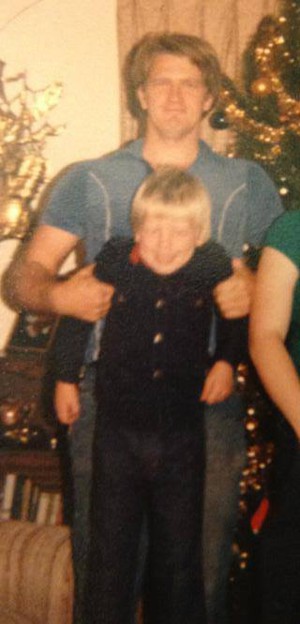So I was leaving the work the other day and a co-worker says “Hey you wanna go grab a drink?”
“Nah, I got to go home and watch this John Travolta movie directed by Fred Durst.”
I look back at my co-worker and they’re staring at me blankly, like their brain just blinked off, and I realize that my previous statement does require some computation to digest. Frankly it sounds like I had a stroke in the middle of it and ended it with a completely different thought, but now you know: Fred Durst makes movies.
And, guys. You guys. They’re good.
THE FANATIC is particularly good, and that’s chiefly due to its two leads, John Travolta (FACE/OFF, PULP FICTION) and Devon Sawa (IDLE HANDS, FINAL DESTINATION). Travolta plays Moose, a film-obsessed simpleton with fabulous hair and a bitchin’ scooter, who inexplicably affords to live alone in Los Angeles as a street performer who portrays a Bobby Cop. His best friend (also inexplicably) is celebrity photographer Leah, played with subtle grace by Ana Golja (“Degrassi: The Next Generation), who unwittingly gives Moose the means to get closer to his idol, action star Hunter Dunbar (Sawa). Moose’s efforts to kindle what he believes will be an undying friendship with the conflicted star go awry, horribly, and the film concludes in a climax wrought with tension and menace.
We see both Moose and Hunter unravel throughout the film, the latter due to poor decisions in his career and life, and the former by the latter, thus creating a vicious cycle that propels the two into a tornado of deteriorating egos. Adding to Moose’s frustration is another, less-scrupulous street performer, shock magician Todd the God, played with manic delight by Jacob Grodnik (DEAR DICTATOR). These street scenes are where we see the director/co-writer’s true view of Los Angeles and the opportunists that flock there. We also get to see Cereal Man, a performer from Wrestling Pro Wrestling with an unmistakable aesthetic, largely unnoticed in the gathered crowd, adding to the surreal acceptance of life in the City of Angels.
There is a moment in the film that finds Hunter Dunbar driving in his car with his son and listening to Limp Bizkit, asking his son if he finds any value in the hard-driving beats and blistering guitar (Wes Borland provides interstitial animated sequences to the film, as well). Even though I consider myself a fan (though I’m sorry to admit, Fred, that I haven’t heard anything past that pink album) I didn’t recognize the song, personally. I have to admit that I groaned and rolled my eyes at the scene, but I also couldn’t honestly say I wouldn’t do the same. I’ve been both a filmmaker and rock musician, and yes, my music did end up in my movie, though I didn’t draw attention to it. (I also didn’t have John Travolta or Devon Sawa in my film, or a theatrical release, so there’s hardly any room for comparison.) This scene, along with head-scratchingly out of place narration by Golja’s Leah, are the two largest detractors from the film’s otherwise confident tone and delivery.
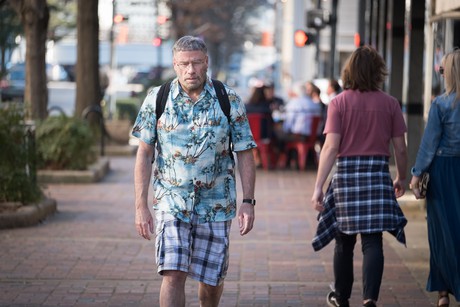
A simple glance at the poster of THE FANATIC, or the film’s tagline “All he wanted was an autograph,” let’s you know to expect the film to take a dark turn, and it most assuredly does. It appears that Durst, who co-wrote the script with first-time screenwriter David Bekerman, may have a bit of worst-case scenario view of fandom, but one can expect that from a fellow who found fame during the heyday of MTV’s celebrity culture hurricane. Respite is found in the dark turns being handled professionally, resulting in a pitch-black taut thriller that sets its unease in you and pulls your spine towards the screen with equal compassion and revulsion. It’s a film experience that will get people talking, and a welcome addition to the midnight films of unrequited love that curdles into something more sinister.
I had the chance to chat with Devon Sawa about his involvement in the film, his refreshingly honest revelations of his inspirations, and his hopes for the film’s future.
Devon Sawa: Hey, Eric! How are you?
Eric McClanahan: Great, thank you! I just got back from New Orleans after spending three days there for my birthday.
DS: Well, glad you made it back! I love New Orleans.
EM: Me, too. I had a wonderful time. So I want to talk to you today obviously about THE FANATIC. Really fantastic film. I was pleasantly impressed, surprised, and blown away by the performances. Tell me how you got involved in this project.
DS: I had to work my ass off to get the part. I’m not going to lie. I laid out every single scene before, every scene you see on that screen. I went to a small little camera studio and got another actor and laid the whole thing down on tape and sent it to Fred Durst. Then I begged and pleaded and after about two days I won the role, but it was a little bit of a fight. I will say this, though, I’d done a movie with Travolta a couple of years ago (LIFE ON THE LINE) and he pushed for me, as well, a little bit but it was still a little bit of a fight. But I got it!
EM: And it was fantastic. I got to talk to Kellan Lutz earlier this year, he did SPEED KILLS with Travolta, and he says that working with Travolta was the greatest pleasure of his life. He says that he comes to set so prepared and is the nicest guy ever. Is that the same experience that you had?
DS: Coincidentally, that’s what John says about me. If you talk to John, he loves working with me, thinks I’m completely professional and on top of my game. [laughs] I got to work with two different Johns. Two years ago I did that LIFE ON THE LINE movie with him, which was whatever. The movie was whatever; not horrible, not the greatest thing ever, but I got to work with that John, which is the John that shows up very professional, a sweetheart, a really nice guy, works on the scenes and contributes. You know, just like a regular actor. On this movie, he stayed in character. He’d show up on set, the crew would call him Moose; they had to. The director would talk to him as if he was Moose. He’d go to craft services as if he was Moose. He would sit in his chair and rock back and forth a little bit like Moose. It was inspiring, it was phenomenal to watch, and it paid off. So, yeah, I’ve got nothing but great things to say about that guy.
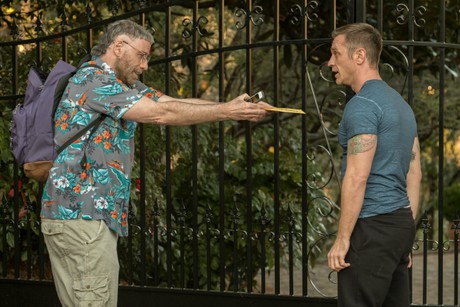
EM: So, your character, Hunter Dunbar. Did you have any ideas in mind about who he might be based upon?
DS: Yes. We pulled a little bit from a lot of different people. There’s a lot of these celebrities, the Sean Penns and the Alec Baldwins, that have been in situations where the paparazzi has perhaps picked at them a little too much and they break at some point. You know, it’s Britney Spears with the umbrella. There’s a breaking point, and that’s what we pulled from. And this guy, Hunter Dunbar, he’s got a lot of shit going on. He’s got problems with his wife and agent, and things going on at home with his son and this and that, and then you add into the equation this guy who is basically a manchild who is crossing the line. It’s a recipe for disaster.
EM: I also noted that you played “Stan” in Eminem’s music video, which is kind of the other side of the fixation.
DS: Yeah, you know, I didn’t put two-and-two together until after the fact. There’s a huge coincidence where I’d switched roles, where essentially I have a “Stan”.
EM: Yeah, my wife actually pointed it out to me. She was like “He’s Stan!” and I said “Oh my God, you’re right.” She loved the movie, too.
DS: Thank you very much.
EM: So, Fred Durst: Director. Tell me about that.
DS: Well, a lot of people don’t know that Fred comes off two great films. He did the movie with Ice Cube (THE LONGSHOTS) and THE EDUCATION OF CHARLIE BANKS, which were both great films that kind of flew under the radar. But he’s been active with music videos before so it’s not like he was just given a movie. He’s been putting in his dues slowly over the years. This is just another stepping stone for him, and the next one’s going to be even bigger. He’s got what it takes; he’s educated on film and he’s got a great energy on set. He knows how to build a team. The DP that he brought in, the wardrobe that he brought in, the different people; he knows what he wants and I think he’s going to go a long way in this business.
EM: Speaking of the actual photography of the film, setting it in Hollywood, what was it like recreating that very real world for the fantasy of this film?
DS: It was great. Conrad W Hall, who was the cinematographer and whose father was the (Oscar-winning) cinematographer for great films like SEVEN (Conrad L Hall), well, Fred just let him play and he made this movie have that dark Hollywood feel to it. It was never glamorous at any time. It was just so dark and that played into everything, became another character in the film.
EM: So what are you working on next?
DS: I’m not working on anything at the moment, but I do have two other movies coming out this year. I have a movie with Guy Pearce (L.A. CONFIDENTIAL, THE PROPOSITION), which is a bucket-list dream of mine; I’ve always wanted to work with him. He’s another one of these legends like Travolta. I worked with Sylvester Stallone and Sharon Stone last year and I’m just banging through this list of these hugely talented people. So I’ve got that Guy Pearce thing (DISTURBING THE PEACE) coming out and in a Jarhead film for Netflix (JARHEAD: LAW OF RETURN) and that’s about it for right now. It was a very busy year last year, fortunately enough.
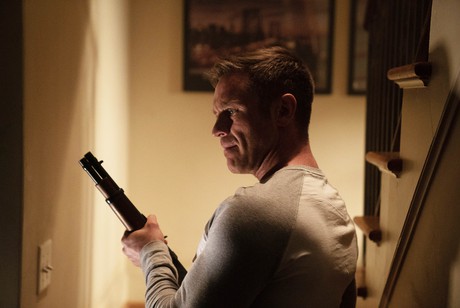
EM: Who else is on this bucket list of dream partners?
DS: Man, I’d love to work with Jack Nicholson. I don’t know if I’ve missed the boat on that one, if he’s retired or not. You know, I’ve been doing this since I was nine and it was always fun, but there was a point when I was about fifteen where something changed on set and it went from being just fun to “You know this is an art” and you start watching these artists like Dustin Hoffman or Jack Nicholson, Robert DeNiro and Sharon Stone and Meryl Streep and those are the kind of people that I want to keep working with, like Travolta. So when I get to set with these people I just want to watch and listen and it’s very rewarding.
EM: So what would you like to see come from the release of THE FANATIC? What are your hopes for the film?
DS: You know, I want it to be one of those independent films that has legs. It comes out and people start talking and the murmuring and word of mouth has people seeing it more and more. That it becomes a cult film for the shelf. I don’t know if anyone does that anymore but back in the day, when I was 19 or 20, everybody had that shelf that they put THEIR movies on, like THE USUAL SUSPECTS, BOONDOCK SAINTS, GOODFELLAS, those kinds of favorites. I want to see it become one of those movies that goes on that shelf.
EM: Let’s talk about that climactic scene in the house. Tell me about Hunter Dunbar’s mindset at that point.
DS: He knows he’s in there with a whacko and he’s doing everything in his power to talk this guy off the ledge. When we were shooting that there was a lot of improv stuff that didn’t end up making the cut of the film; I’m hoping that one day Fred does an extended cut of the film. Travolta had these tricks up his sleeve, and I don’t know if it has to do with copyright, but he started imitating these different performances from old horror movies and it got wild in there for a few days. It was really, really crazy. But the mindset of Hunter is that he’s just got to get out, he’s got to get away from this guy, because this guy could do anything to him.
EM: Yes, but afterwards, when he has the control of the situation, he goes to a very dark place.
DS: Well, yeah, he loses it. That’s it. That’s the Alec Baldwin/Sean Penn moment where you wonder, well he has the right to do it. This guy had him tied to a bed, was potentially going to light him on fire, and whatnot. And that’s it! That’s the last straw! I’m [redacted], buddy! That’s just when he loses it. That’s the Britney Spears Umbrella Incident right there.
EM: If you were forced to decide, is there a protagonist in the film and who is it?
DS: That’s a tough one. That’s what we want the audience to be confused about. When you’re watching the film, that climactic scene, who are you rooting for? Do we want the audience to feel sorry for Moose or do we feel sorry for Hunter?
EM: Well you definitely achieved that. Any final thoughts?
DS: I just hope that people go to the film and see it. It’s playing in every major city for a week or so, so I hope everybody gets there.
EM: I hope so, too. It’s a great film. Thank you for talking to me today.
DS: Thank you, sir. I appreciate it.
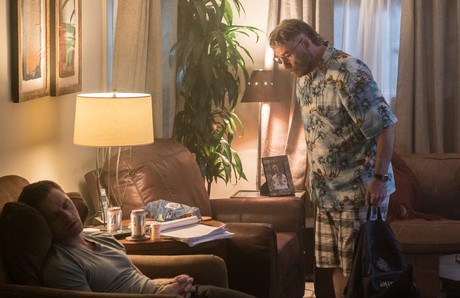
THE FANATIC will be released theatrically this Friday, August 30th, then Digital and On Demand September 6th, 2019. Both Travolta and Sawa turn in brave performances that are largely unexpected from such a small-banner title, showing a dedication to their craft and confidence in the work of the team behind them. We owe it to them to meet that confidence, because without the fans, they’re nothing.
See you at the movies!
-McEric, aka Eric McClanahan-
